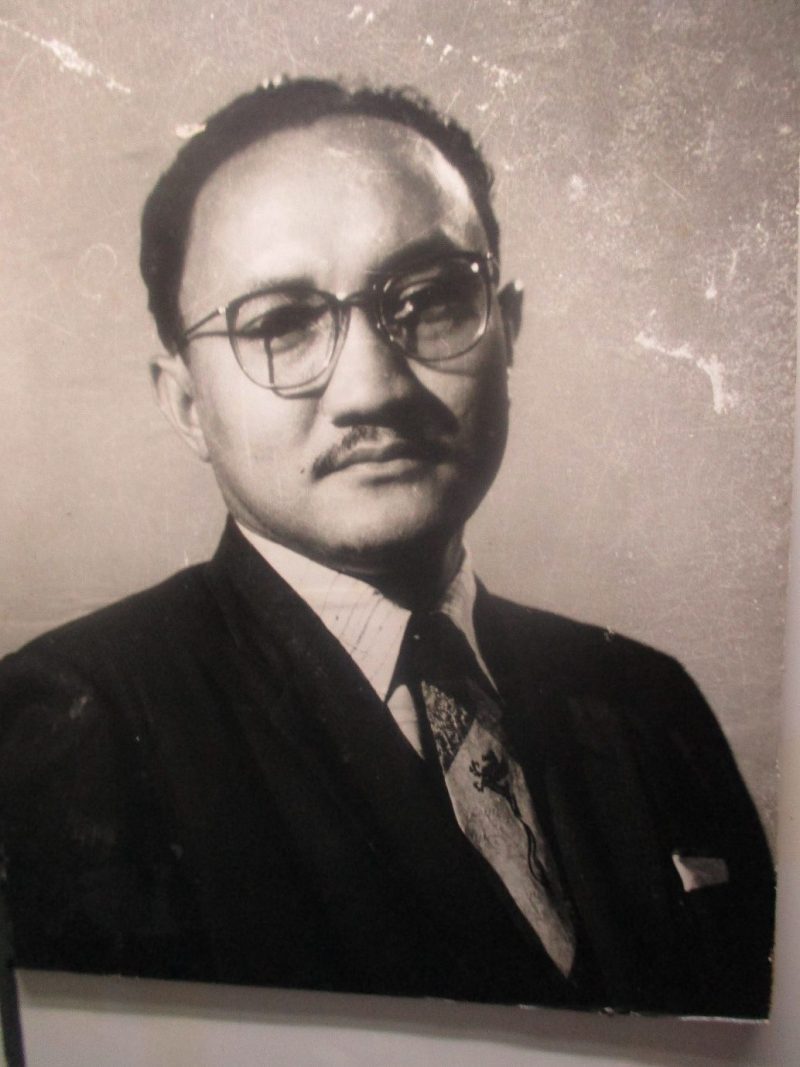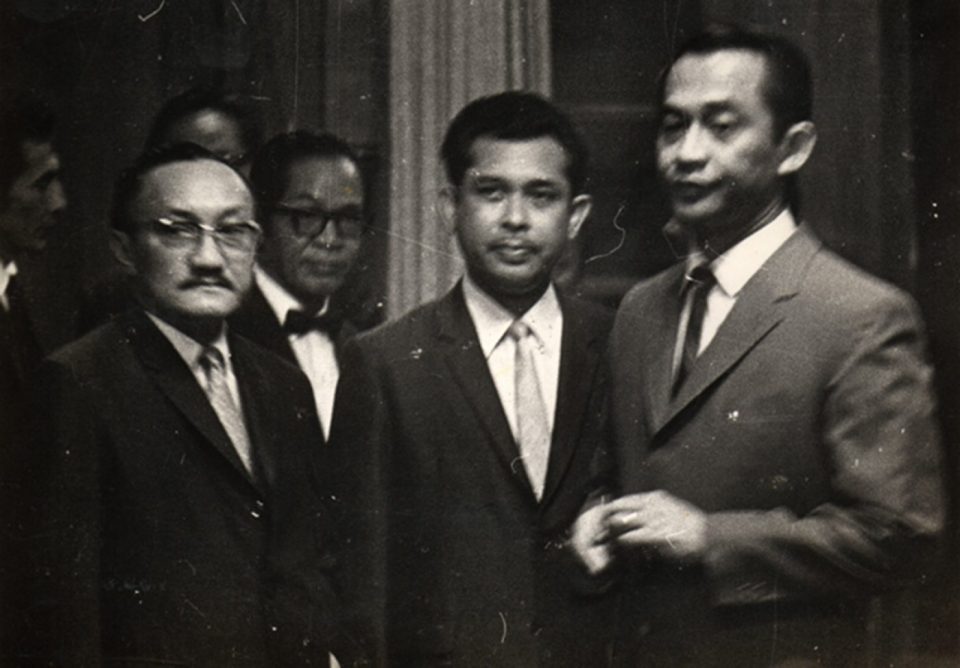Usmar Ismail is known as the father of modern Indonesian cinema. He was born on 20th March 1921 in Bukittinggi, West Sumatra.
His first movie, Darah dan Doa (Blood and Prayer) was shot on 30th March 1950. This date is now thought of as the country’s national movie day as it starred and was produced and directed by Indonesians under the umbrella of the Indonesian National Film Centre (Perfini), which Usmar established himself.
Usmar’s complex personality — as a producer, director, journalist, artist, and writer — is inseparably linked to his reputation as a man of critical reasoning. This seems to be overlooked when discussing his life. Watching his various films, few realise that his ideas have transcended their time. In Harimau Tjampa (Tjampa Tiger, 1953) and Tiga Dara (Three Maidens, 1957), for example, we can learn how the egalitarian spirit between men and women is tangible and strong. Meanwhile, in Lewat Djam Malam (After the Curfew, 1954), Usmar carefully touched on the country’s next chronic issue, namely corruption, seen from burgeoning post-power syndrome befalling soldiers at the time. Likewise, in Crisis (1953), power manipulation started getting widespread, with the film showing a former soldier stealing state money for his wife.
Usmar’s visionary ideas seen in his movies cannot be separated from three important factors as his oasis of inspiration. First, freedom of thought and expression were abundant. During the 1950s, thinkers, humanists, authors, and artists enjoyed a golden age of freedom of expression. Poets who began their writing career during and after the mid-50s included Kirdjomuljo, Subagio Sastrowardojo, WS Rendra, Ajip Rosidi, Toto Sudarto Bachtiar, Ramadhan Kh., Sugiarto Sriwibowo, Mansur Samin, Djamil Suherman, Hartojo Andang-djaja, and more. In the 1950s, Indonesian master painter Affandi held many solo exhibitions in India, Britain, Europe, and the United States. Even the country’s first and most democratic election took place in 1955.
The conducive atmosphere led Usmar to not only produce his experimental audiovisual works, but also to offer moviegoers deep insights widely seen from various characters in many of his films. He did not hesitate to disturb people’s doubts about the question of where to go or what kind of Indonesian concept people were dreaming of.
Through his great comprehension of movies as a storytelling medium, which is always relevant regardless of place and time, Usmar stood against censorship. In his attempt to educate and attract people to movies, he further believed that everything does not need to be discussed and exposed verbally in the storyline, rather he let non-verbal aspects such as gestures play the role — eye contact, a handshake, bowing, and many others. Censorship, for Usmar, would only limit the breadth of communication and culture, reducing the fertile breeding ground for freedom and opportunities to produce the country’s quality movies. Moreover, he fully understood that the pressure to self-censor had been so much about business interest rather than political pressure.
Second, education is very important. Though Usmar was equipped with a myriad of artistic and writing experiences as a performer and journalist back in the Japanese era, he viewed education as incredibly important to produce better and higher-quality movies. This was particularly true considering his dream of realising the national film industry together with his other colleagues, including Asrul Sani and Djamaluddin Malik.
Usmar opined that film school is so important because filmmakers need to comprehend the technicalities of movies. When it comes to aesthetics, many people can learn quickly. Indonesian cultural resources help filmmakers get to know the aesthetical aspects very quickly and naturally. However, the technical problems are closely related to science and technology. Usmar’s movies, which were kept in a contemporary and relevant mood, honestly has to do with his educational background. His ability to produce realism-based movies was greatly enhanced by his experience of studying film at UCLA and Hollywood.
Thanks to his educational background and expertise, Usmar positioned himself as a game-changer, putting considerable stress upon the country’s movie sustainability, which is still a relevant issue today. Without sustainable movies, do not expect that a growing and strong film industry will prevail in Indonesia. Have a look at the Korean movie industry. Their film industry is going global now, owing to their ability to combine aesthetic and technical aspects resulting from a serious educational process. Korean filmmakers have long gone to the world’s best film schools prior to working on and exporting their film industry.
Third, adaptability is central to survival. Muhammad Alwi Dahlan, the father of Indonesian communication science, has written nine scenarios for Usmar’s films. He said that originally, Usmar’s parents expected him to undertake Islamic studies at Al-Azhar University in Cairo, Egypt. After migrating to Jakarta, however, he found that the nation was in dire need of a cultural and artistic revival during revolutionary times. As a Minangnese familiar with the philosophy, “dimana bumi dipijak di sana langit dijunjung” (where the earth is trodden there the sky is upheld) — meaning that wherever we live, we must observe the local customs — Usmar chose to adapt to the needs of his time and society, even though it ran contrary to his parent’s wishes.
His life choice to work in the fields of art and culture were done seriously and conceptually. He was trying to produce films involving Indonesian film workers, cast, and stars. Usmar’s adaptability and quality touch were proven by bringing up themes which many people were still embarrassed by or reluctant to discuss. Through Crisis (1953), Usmar captured the public’s anxiety in responding to dislocated soldiers in the postwar era engaging in power manipulation. Ever since, Indonesian films have started to be looked at by cinemas that have been long controlled by businesspeople having interest only in Hollywood or cheap films.
Even though Usmar Ismail’s contribution to the Indonesian film industry is undeniable and gigantic, his life journey was tragic at the end. His life is, in many ways, similar to the life journey of P. Ramlee, a Malaysian actor, filmmaker, musician, and composer. It remains hopeful that Indonesian filmmakers’ calling for the government bestowing Usmar Ismail with the title of National Hero, on the 71st National Film Day, may materialise.




